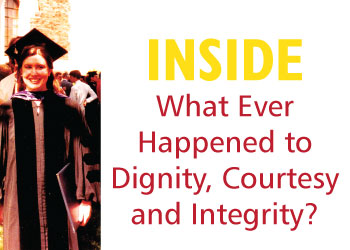What Ever Happened to Dignity, Courtesy and Integrity?
 Is the legal profession still noble, learned and civil? In 1982, over 40 years ago when I participated in my California State Bar admission ceremony at the Memorial Auditorium in downtown Sacramento, I truly believed the hallmark of our legal profession was civility. I grew up watching the Perry Mason television series and saw that attorneys Perry Mason and Hamilton Burger were zealous advocates for their clients but were not rude or obnoxious to each other.
Is the legal profession still noble, learned and civil? In 1982, over 40 years ago when I participated in my California State Bar admission ceremony at the Memorial Auditorium in downtown Sacramento, I truly believed the hallmark of our legal profession was civility. I grew up watching the Perry Mason television series and saw that attorneys Perry Mason and Hamilton Burger were zealous advocates for their clients but were not rude or obnoxious to each other.
Increasingly, there is a sense that attorneys don’t always conduct themselves with “dignity, courtesy, and integrity.” This language is part of the “new” oath which the California Supreme Court implemented in 2014 when they adopted Rule of Court 9.7. Should we go “beyond the oath” and mandate civility with referrals of attorneys to the state bar discipline system to curb repeated incivility?
In this timely edition of the Contra Costa Lawyer magazine, we explore this “hot button” issue and discuss various ways to restore civility. Our first article from Jay Chafetz, a former research attorney for the Contra Costa County Superior Court and principal drafter of the Discovery Facilitator Program rules, provides an insider’s view of civility in discovery. He encourages attorneys to apply to serve as a Discovery Facilitator to assist the courts and litigants with their discovery disputes.
Second, in her article titled “Civility Matters: A guide to practicing in the Northern District of California Federal Courts,” Corrine Bielejeski outlines how federal court practitioners must follow two sets of rules which govern civility: the Northern District rules and our state Rules of Professional Conduct. She provides tips on how to work with opposing counsel, not against them when dealing with discovery, scheduling, and preparation of various motions and joint status conference statements. She provided you with an MCLE Self-Study questionnaire to test your knowledge of the subject and receive MCLE credit.
Judge Virginia George, who presides in Department 30, provides her perspective on “Civility in the Courtroom.” From her view on the bench, hearing countless motions and trials, she describes why attorneys should promote civility and gives us valuable tips to avoid inadvertent incivility.
Next, attorney Peter Mankin, who has practiced law for 47 years as a litigator and mediator, describes his outlook that civility has eroded over the years. He reminds us of the practice of law in Contra Costa County many years ago, where attorneys gathered together for monthly lunches at the Velvet Turtle or Zio Fraedo’s, often with judges. These gatherings established a camaraderie and one-on-one personal communication– and more civility. He recommends simple tips we can all practice daily to restore it.
Alana Grice Conner, one of the newest members of the CCCBA, highlights the requirement for civility in mediation asking that the parties and attorneys involved treat each other with respect. She observes that attorneys often use their litigation tactics in mediation which is often counterproductive to the process of compromise and settlement.
Finally, I have authored an article entitled “Mandating Civility-Beyond the Oath.” In 2014, the California Supreme Court at the recommendation of the State Bar of California Board of Trustees, took a step towards improving civility among California attorneys. It adopted Rule of Court 9.7 adding new language to the Oath of Admission for attorneys entering the bar after 2014. I explore the question – should we go beyond the oath and mandate civility? Both the California Lawyers Association and California Judges Association advocated for “remedial action.” Four key proposals were discussed in their September 2021 report. In March 2022, the state bar Board of Trustees voted to implement some of the recommendations including MCLE training on civility, enacting a new Rule of Professional Conduct addressing attorney “repeated incivility” and requiring every attorney to take the oath affirming the principles of acting with “dignity, courtesy, and integrity.”
I thank all of the authors who have contributed to this edition with their insightful articles. I hope that it provides some useful tips for attorneys when confronted with uncivil behavior. It is important that we go beyond the oath and model civility. We should follow the sage words of Supreme Court Chief Justice Warren Burger and become “living exemplars.”